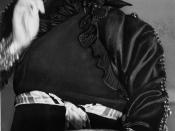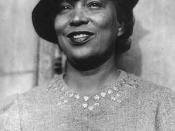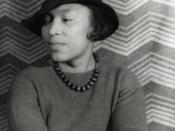In "Their Eyes Are Watching God", Zora Neale Hurston uses figurative language in the passage on pages 158-159 to foreshadow events to come as well as add life to the story. Metaphors, similes, and personification are used together collaboratively to create a specific mood and image to represent the theme of this passage with still leaving room for the true meaning which is to be revealed later on in the story.
Hurston's use of personification and metaphors together create a mysterious gloomy mood. In the line "drifting mists gathered in the west...to arm them selves with thunders to march forth against the world...mounting, sinking, darking" on page 158, the mists are being personified and this gives an image of power from the mists arming themselves and marching against the world. Night is also personified on page 158 in the line "Night was striding across nothingness with the whole round world in his hands", because night is not a living figure and cannot hold the world.
A metaphor is also used from comparing nothingness to the whole world. Throughout the entire passage, the storm is being brought to life and described in a way to show its potential harmful effects on the characters and their surroundings.
In this passage, similes are used to represent the power of the storm. In the lines "It woke up old Okechobee and the monster began to roll in his bed. Began to roll and complain like a peevish world on a grumble" (pg. 158) Hurston compares the storm to a complaining monster, showing its power and that it is capable of causing harm to those around it. This line also personified the storm from its description of waking up Okechobee, a body of water, which cannot sleep.
To conclude, Hurston's use of figurative language...


